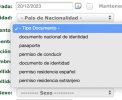- Time of past OR future Camino
- First: Camino Francés 2002; most recent: Norte/Primitivo 2019
Last week, there was an announcement related to the formation of the Acogida Tradicional Jacobea, with traditional pilgrim accommodations on the Caminos del Norte and Primitivo joining together in solidarity to promote this unique form of hospitality. This was driven in part by ongoing concerns about developing legislation that might pose a threat to donativo-based albergues.
Over the last few days, the Camino Francés Federación has raised an alert about Royal Decree 933/2021, which is poised to become law in January and require much more extensive information-logging/keeping in all accommodations in Spain. Here's their description of this, courtesy of Google Translate:
"Today, a new regulation threatens to endanger the very essence of this tradition. A Royal Decree, scheduled to definitively come into force in January 2024, could cause the disappearance of a large part of those who carry out this activity due to the disproportionate regulations it imposes, and the technical and human needs it demands.
"We face not only a challenge that deeply affects our unique experience on the Camino, but also makes us reflect on our rights and those who visit us. Starting in January 2024, the places where we stay will be required to collect more than 30 personal data of all types, which must be kept for a period of 3 years and communicated to the security and protection forces of the State. Data that far exceeds the information that has been required to date, and is as sensitive as the means of payment used in the reservation, the credit card number, the expiration date of the card or the bank account number of the headline.
"The challenge is even greater in rural shelters, which often lack the technological resources necessary to comply with the new regulation. This implies that the collection of required data would be done manually, which could result in long queues and frustration for exhausted pilgrims."
In response to this, the CFF has organized a petition, accessible here, along with the full text of their announcement in the original Spanish.
Over the last few days, the Camino Francés Federación has raised an alert about Royal Decree 933/2021, which is poised to become law in January and require much more extensive information-logging/keeping in all accommodations in Spain. Here's their description of this, courtesy of Google Translate:
"Today, a new regulation threatens to endanger the very essence of this tradition. A Royal Decree, scheduled to definitively come into force in January 2024, could cause the disappearance of a large part of those who carry out this activity due to the disproportionate regulations it imposes, and the technical and human needs it demands.
"We face not only a challenge that deeply affects our unique experience on the Camino, but also makes us reflect on our rights and those who visit us. Starting in January 2024, the places where we stay will be required to collect more than 30 personal data of all types, which must be kept for a period of 3 years and communicated to the security and protection forces of the State. Data that far exceeds the information that has been required to date, and is as sensitive as the means of payment used in the reservation, the credit card number, the expiration date of the card or the bank account number of the headline.
"The challenge is even greater in rural shelters, which often lack the technological resources necessary to comply with the new regulation. This implies that the collection of required data would be done manually, which could result in long queues and frustration for exhausted pilgrims."
In response to this, the CFF has organized a petition, accessible here, along with the full text of their announcement in the original Spanish.

























